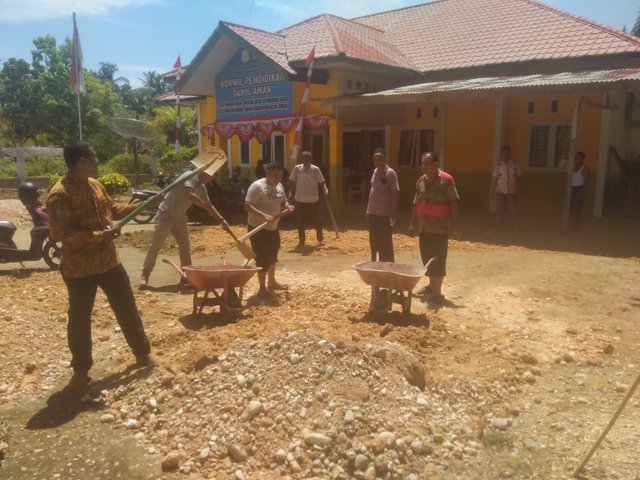The hallmark of the Indonesian nation which to this day continues to be preserved in the order of social life is the values of togetherness, one of which is mutual cooperation, where on certain days both in villages, groups, and other communities they take their time to be together and preserve places. public) within their community on Friday 27 August 2021.

This activity is the original values of the archipelago that have been passed down from generation to generation in the ethnic cultural environment throughout Indonesia.
This was conveyed by the Head of Korwil Darul Aman, East Aceh Regency, Yusnil.Spd.Mpd during a Clean Friday activity, where dozens of elementary school principals performed Mutual Cooperation at the Regional Korwil Darul Aman Office.
"Gotong royong values that grow and develop in the social order are part of the nation's cultural value system, and these need to be preserved in order to strengthen the social integration of the community both in villages and other community groups to strengthen the Unitary State of the Republic of Indonesia," he said.
Furthermore, Yusnil also invites all elementary school principals under his coordination to preserve the culture of mutual cooperation in their respective schools, not only in the regional coordinator, he said, but mutual cooperation activities can be carried out where the school is on duty, and this as a form of togetherness can create harmony, peace , full of kinship and work hand in hand in building a clean and comfortable school environment. "Is not cleanliness part of half faith," he said.
The same thing was conveyed by one of the Principals of SD Ridwan Spd who also added that the wisdom of local cultural values in the aspect of gotong royong can be developed to become potential in the implementation of development.
"To take advantage of this potential, it is supported by increasing human resources, as well as organizations that partner with all elements, both community leaders and the role of the media in carrying out their social control tasks, and these are partners, who can be expected to be motors in development change to improve welfare and community independence,